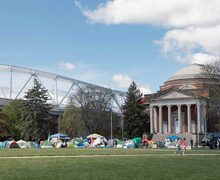Committee finds SU graduate employees don’t make living wage
TJ Shaw | Staff Photographer
A survey conducted by the GSO's Employment Issues Committee showed that SU graduate students with assistantships made less than the cost of attendance.
UPDATED: NOV. 29, 2018 7:07 p.m.
Syracuse University’s Graduate Student Organization voted to pass a resolution for all graduate assistants and fellows to be paid a living wage at its meeting on Wednesday.
After conducting a survey of the graduate student body, the GSO Employment Issues Committee found that 75 percent of graduate assistants receive less pay from the university than the cost of attendance. The GSO had voted at its previous meeting to present a report detailing graduate employee wages to Chancellor Kent Syverud but decided to conduct the survey before sending the report.
The committee asked graduate students to provide an estimate of their salaries from SU. It then calculated the cost of attendance and expenses of graduate students with assistantships based on estimates from SU’s website.
Committee members found that the average cost of attendance for graduate students on assistantships was $22,432. The estimated living wage for people in Onondaga County is $22,991, according to a living wage calculator from the Massachusetts Institute of Technology.
At an Oct. 31 GSO meeting, senators struggled to come up with a way to approach Syverud about the situation of graduate and doctoral assistant living wages. Many senators had left the previous meeting before it ended, so the GSO’s executive board postponed finalizing the organization’s position on graduate assistant wages until the Nov. 28 meeting.
One senator pointed out that some master’s students in assistantships are given the same assistant work as doctoral assistants but are paid less.
Earlier in the meeting, Brian Konkol, dean of Hendricks Chapel, said he wants to create opportunities for graduate students who are either studying abroad or taking online classes. Hendricks Chapel started a Student Opportunity Fund to help students, mostly international and graduate students, with need-based funding for academic and necessary expenses, such as medication and rent.
Konkol said the word “opportunity” doesn’t restrict the fund to emergency needs. The fund could help students pay for research opportunities and join clubs, among other things. The chapel is also trying to work more with digital communication platforms to bring its services to previously excluded audiences, such as online students.
The dean also said he wishes to make physical alterations to the chapel to further encourage practice of all religions in the chapel.
“How can Hendricks Chapel be a value to graduate students?” he said. “That’s something we are thinking of a lot.”
Other business:
- GSO plans on recruiting students from underrepresented programs, especially physics and architecture, to be senators.
- The organization raised the question of how online graduate students should be represented because it is generally harder for them to be part of campus affairs.
- A position for University Senator opened, and an election will take place. The elected candidate will act in University Senate for the remainder of the academic year.
Clarification: In a previous version of this post, the time Dean Brian Konkol spoke was unclear.
Published on November 28, 2018 at 11:43 pm
Contact Richard: [email protected] | @RichardJChang1





